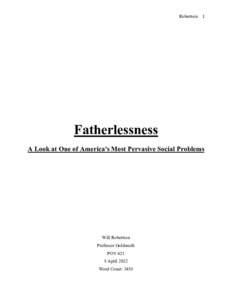Fatherlessness, A Look at One of America's Most Pervasive Social Problems

View/
Author
Robertson, William O.
Subject
Washington and Lee University, Shepherd Poverty Program
Fatherless families
Parenthood
Households
Prison sentences -- Government policy
Children of prisoners
Metadata
Show full item recordDescription
Capstone; [FULL-TEXT FREELY AVAILABLE ONLINE] William O. Robertson is a member of the Class of 2022 of Washington and Lee University. Despite the increasing prevalence and negative consequences associated with fatherlessness in America, very few policies or community resources have been effectively dispatched to combat this social issue. However, after collecting and reviewing data on fatherlessness and its impacts and also framing educational attainment as the up river issue at hand, several policy recommendations could be implemented that would reduce the rate of fatherlessness in the US while also promoting educational attainment. First, grants should be established so that sociologists, economists, and other scholars can have their research of fatherlessness sponsored in order to promote more studies on the subject. While there were studies published in the late 90's and early 2000's in the United States on fatherlessness, momentum has slowed in regard to research on the topic, which has led to decreased attention from media and governmental bodies. The publication and disbursement of these studies would also raise awareness in the general public, which could lead to better treatment of fatherless children by communities across the country. . . . Secondly, governmental bodies should divert more funding towards revamping the K-12 education system in the United States. While funding alone cannot "fix" education in the US, creating a more engaging and robust public school system requires more resources in order to attract better talent in administrators and teachers, to build better facilities for classrooms and other school facilities, and to establish counseling centers within schools. . . . Lastly, changes to the justice system that would incorporate a person's family status into their sentencing could radically alter the incarceration rates of fathers in the United States, who currently comprise 92% of incarcerated parents. While this change in and of itself is the most radical, it also has the most potential for change, as it coincides with increasing momentum to change sentencing regulations for non-violent crimes in the United States. For fathers who have committed non-violent crimes, sentencing that includes jail or prison time not only negatively affects them, but also their children. By incorporating family status (and fatherhood status in particular) into sentencing, other punishments such as house arrest could be utilized more frequently, which would lessen the negative impact that losing a father due to jail or prison induces on a child. [From Analysis section] Will Robertson